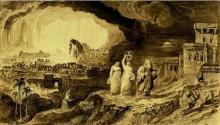Shabbat Shalom and welcome to Judeo Talk. This week, the Torah portion is Vayeira, some of the most famous, as well as some of the most busy, chapters of the Tanakh. In this portion we find the destruction of Sodom and Gomorrah, the rather dark story of Lot, the expulsion of Hagar and most importantly the akedah, the binding of Isaac. There is no portion of the Torah so loaded as this one, but as most parshiot go, this one runs on a theme.
All of the stories in Vayeira have something in common. While each one plays out on a different scale, some as big as whole nations and others within a single household, they all use family as the overarching model for the human experience.
In fact, there is hardly a single story in the Five Books of Moses that doesn't somehow center around family of some sort. All of Genesis is a series of family dramas ultimately leading to the descendants of Abraham settling in Egypt; Exodus is as much about the way Moses's two families, the royal family of the pharaoh and the blood relatives he discovers later, differ in their core values; even as the Israelites wander in the wilderness for the remainder of the Tanakh, their leaders are all related and their individual stories focus on fathers, wives, sons and daughters. Judaism as a faith, culture and lifestyle has followed suit in this way. Everything begins and ends with the family.
Arguably, the entire book of Genesis is a compendium of sin, Vayeira especially. The detailed dramas of this contemplation on the nature of sin take place in family settings. For example, the destruction of Sodom and Gomorrah is in the background of Lot's sordid story. This is hardly a coincidence. We watch the cities burning under divine wrath as Lot commits his worst sin, offering his daughters to a mob that would rape them so they wouldn't attack God's messengers. By relinquishing the safety and purity of his own family, Lot brought on the destruction of the cities where he made his home. Just prior to this scene, Abraham talks to God about sparing the cities. God, in so many words, agrees to forgo their destruction for the sake of any good people who live there. By going through with the assault, God is essentially saying that no good people, not even the ostensibly righteous Lot, dwell there.
The implication of these stories is that no one can be expected to helm an entire nation if they can't even protect their family. And in these stories, whole nations really are on the line. Abraham's descendants will fulfill the Covenant and literally be a nation. These stories prove that this family, however great their destiny, has a very long way to go before it's ready for such a huge responsibility.
We are supposed to see this lesson in the text, that we have a responsibility first to our families. To destroy the sanctity of our households is to give up an entire city, even a nation. Sin, as it is depicted in the Torah, is to do harm to our kin.
